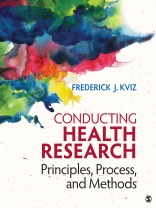Conducting Health Research: Principles, Process, and Methods presents an integrated and practical introduction to the principles and strategies for planning, implementing, reporting, and assessing health sciences research. Comprehensive in its breadth and depth, with an accessible writing style, this text prepares students in public health and related fields to be adept researchers and consumers of health research.
Through real-world examples and step-by-step guidance, Frederick J. Kviz provides students with the skills they need to: identify and evaluate research strengths and limitations as practitioners; to actually perform the various core aspects of research; and to choose among alternative methods when making decisions about health practice, policy, and future research needs.
Jadual kandungan
Preface
Companion Website
About the Author
Chapter 1 • The Nature and Process of Research
Learning Objectives
Overview
The Nature of Research
The Research Process
Key Points
Review and Apply
Study Further
Chapter 2 • Conducting Ethically Responsible Research
Learning Objectives
Overview
Ethical Principles of Research With Human Subjects
Federal Regulations
Privacy Protection
Key Points
Review and Apply
Study Further
Chapter 3 • Variables and Relationships
Learning Objectives
Overview
Types of Variables
Attributes of Relationships
Causal Concepts
Key Points
Review and Apply
Study Further
Chapter 4 • Research Design Diagrams and Components
Learning Objectives
Overview
Research Design Diagrams
Research Design Components
Key Points
Review and Apply
Study Further
Chapter 5 • Research Design Validity
Learning Objectives
Overview
Observational Designs
Causal Designs
Internal Validity Threats and Strategies
External Validity Threats and Strategies
Balancing Internal and External Validity
Key Points
Review and Apply
Study Further
Chapter 6 • Research Designs
Learning Objectives
Overview
Observational Designs
Causal Designs
Key Points
Review and Apply
Study Further
Chapter 7 • Random Sampling and Assignment
Learning Objectives
Overview
Random Sampling
Random Assignment
Key Points
Review and Apply
Study Further
Chapter 8 • The Measurement Process
Learning Objectives
Overview
From Concepts to Data
Levels of Measuremen
Measurement Theory
Assessing Measurement Reliability
Assessing Measurement Validity
Item Response Theory
Key Points
Review and Apply
Study Further
Chapter 9 • Developing a Measurement Instrument
Learning Objectives
Overview
The Instrument Development Process
Using Existing Instruments
Developing a Rating Scale
Key Points
Review and Apply
Study Further
Chapter 10 • Developing a Structured Questionnaire
Learning Objectives
Overview
Key Concepts
Questionnaire Development Process
Questionnaire Design and Data Collection Mode
Questionnaire Format
Questionnaire Structure
Key Points
Review and Apply
Study Further
Chapter 11 • Writing Survey Questions
Learning Objectives
Overview
Types of Questions
Question Wording
Question Structure
Response Choices
Key Points
Review and Apply
Study Further
Chapter 12 • Survey Research Methods
Learning Objectives
Overview
Basic Concepts
Data Collection Modes
Conducting a Survey
Interviewing
Key Points
Review and Apply
Study Further
Chapter 13 • Qualitative Research Methods
Learning Objectives
Overview
Basic Concepts
Qualitative Interview Methods
Observation Methods
Sampling
Mixed Methods
Key Points
Review and Apply
Study Further
Chapter 14 • Secondary Analysis and Existing Data
Learning Objectives
Overview
Basic Concepts
The Secondary Data Analysis Process
Advantages, Limitations, and Ethics
Secondary Data Sources
Synthesizing Results From Multiple Studies
Key Points
Review and Apply
Study Further
Chapter 15 • The Analysis Process and Reporting Results
Learning Objectives
Overview
The Data Analysis Process
Overview of Quantitative Data Analysis
Overview of Qualitative Data Analysis
Reporting Research Results
Key Points
Review and Apply
Study Further
Glossary
References
Index
Mengenai Pengarang
Frederick J. Kviz, Ph D, is Professor Emeritus, Community Health Sciences, at the University of Illinois at Chicago School of Public Health. He completed his BA, MA, and Ph D degrees in sociology at the University of Illinois at Chicago. In addition to Conducting Health Research: Principles, Process, and Methods, He authored (with Kathleen A. Knafl) Statistics for Nurses: An Introductory Text, which received an American Journal of Nursing Book of the Year Award. He has authored and co-authored 55 peer-reviewed publications, as well as many monographs, technical reports, and professional meeting presentations. Dr. Kviz has developed and taught a variety of courses and workshops on research methods and statistics for undergraduate and graduate health sciences students, and for academic and practicing health professionals. His teaching has been recognized by awards for excellence based on peer reviews and student recognition. Also, he was inducted as a faculty member in the Lambda Chapter of the Delta Omega Honor Society (the public health honor society). He is a former Project Coordinator and Assistant Director of the University of Illinois Survey Research Laboratory, and is an expert in survey research methods, research design, and measurement. He has served as a consultant to many public and private health-related agencies, including community-based organizations, health maintenance organizations, city and county health departments, and major medical centers. Dr. Kviz’s research has focused on the influence of psychosocial and sociocultural factors on health promotion and illness prevention attitudes and behaviors, and health disparities. His research has involved employing most of the methods described in Conducting Health Research: Principles, Process, and Methods.












